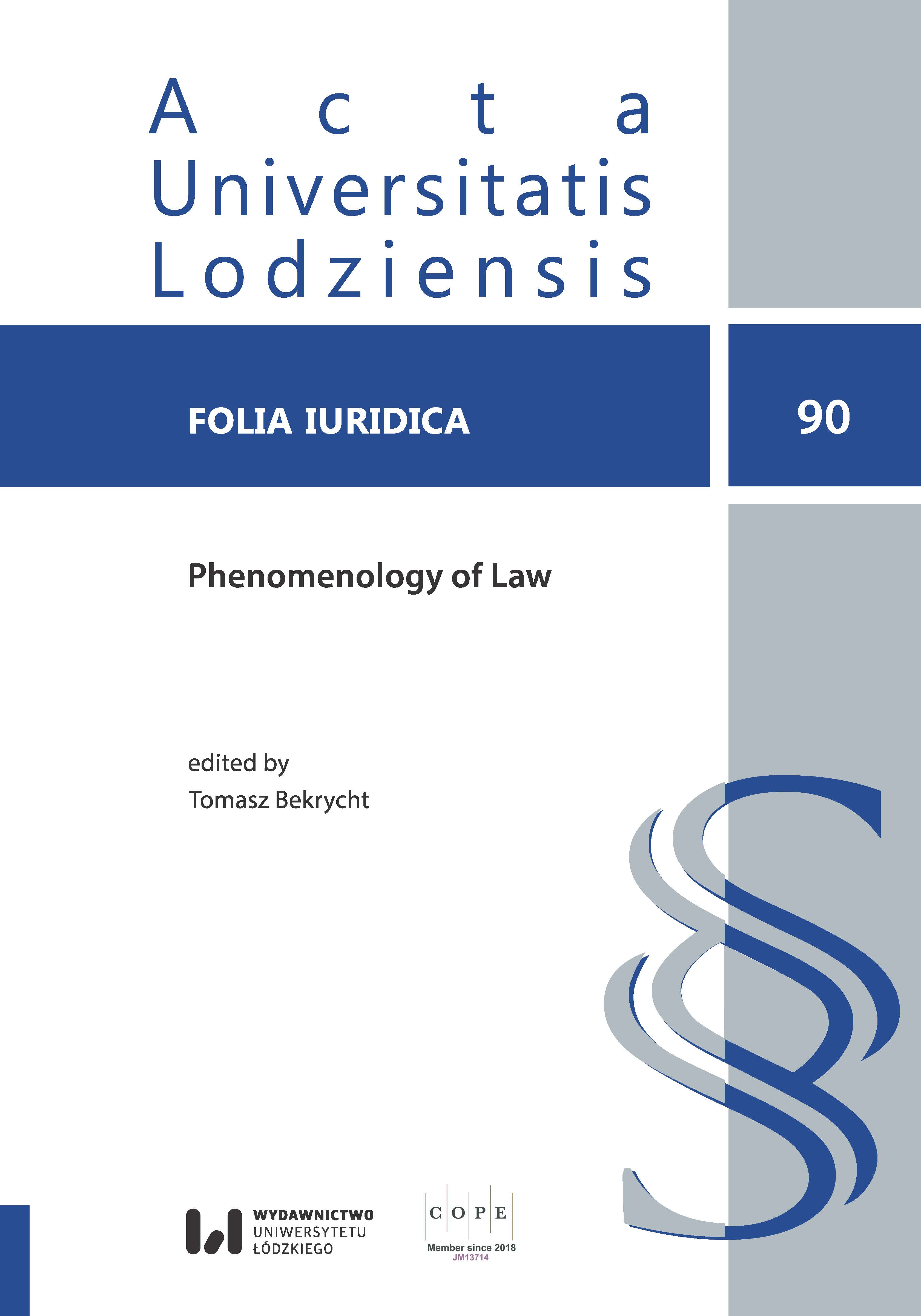Phenomenological Concept of Law from the Perspective of Carlos Cossio
DOI:
https://doi.org/10.18778/0208-6069.90.09Keywords:
phenomenology, egology, legal philosophy, hermeneutics, axiologyAbstract
The originality of Cossio’s works is expressed by a strong relationship between philosophy of law and his philosophical assumptions. The starting point for deliberating on law are widely recognized ontological and epistemological contentions. Cossio justifies his legal theses basing them on his philosophical views. Egology derives from Edmund Husserl’s phenomenology which is related to some elements of William Dilthey’s philosophy of culture. Martin Heiddeger’s and Immanuel Kant’s philosophies are the basis too. The first part describes Cossio’s ontologies of subjects otherwise known as regional ontologies. Methods for examining the above subjects and gnoseological acts are presented here too. The second part presents the characteristics of law as a cultural subject. The article is not only a report. Its aim is also to show that Carlos Cossio’s legal philosophy is semantic in character.
Downloads
References
Arystoteles. 2003. Dzieła wszystkie. Vol. I. Warszawa: Wydawnictwo Naukowe PWN.
Google Scholar
Bekrycht, Tomasz. 2009. Aprioryczność prawa, Ontologia prawa w fenomenologii Adolfa Reinacha. Warszawa: Wolters Kluwer Polska.
Google Scholar
Cossio, Carlos. 1948. ”Phenomenology of the decision”. In Latin-American Legal Philosophy. 343–400. Edited by Luis Recasens. Cambridge, MA: Harvard University Press.
Google Scholar
DOI: https://doi.org/10.4159/harvard.9780674428799.c3
Cossio, Carlos. 1964. La Teoria Egologica del Derecho y el Concepto Juridico de Libertad. Buenos Aires: Abeledo-Perrot.
Google Scholar
Cossio, Carlos. Eugenio Pucciarelli. 1938. ”La comprehension en Dilthey”. Humanides 26: 320.
Google Scholar
Dębowski, Józef. 2000. Bezpośredniość poznania. Lublin: Wydawnictwo Uniwersytetu Marii Curie-Skłodowskiej.
Google Scholar
Dilthey, Wilhelm. 1958. Gesammelte Schriften. Vol. V. Stuttgart: Teubner.
Google Scholar
Husserl, Edmund. 1989. Wykłady z fenomenologii wewnętrznej świadomości czasu. Warszawa: PWN.
Google Scholar
Ingarden, Roman. 1963. Z badań nad filozofią współczesną. Warszawa: PWN.
Google Scholar
Kant, Immanuel. 1996. Critique of Pure Reason. Vol. I. Indianapolis: Hackett.
Google Scholar
DOI: https://doi.org/10.1017/CBO9780511809576
Kuderowicz, Zbigniew. 1967. Dilthey. Warszawa: Wiedza Powszechna.
Google Scholar
Martel, Karol. 1967. U podstaw fenomenologii Husserla, Warszawa: Książka i Wiedza.
Google Scholar
Spiegelberg, Herbert. 1960. The Phenomenological Movement. Vol. I. Dordrecht–Hague: Springer.
Google Scholar
DOI: https://doi.org/10.1007/978-94-017-5920-5
Stróżewski, Władysław. 2006, Ontologia. Kraków: Znak.
Google Scholar
Tischner, Józef. 1982. Myślenie według wartości. Kraków: Znak.
Google Scholar
Wróblewski, Jerzy. 1957. ”Fenomenologiczna filozofia prawa w Ameryce Łacińskiej”. Państwo i Prawo 6: 1185–1197.
Google Scholar
Wróblewski, Jerzy. 1966a. ”Filozoficzne założenia podstawowych pojęć egologii.” Zeszyty Naukowe Uniwersytetu Łódzkiego. Seria I 44: 3–31.
Google Scholar
Wróblewski, Jerzy. 1966b. ”Postawa filozoficzna i afilozoficzna we współczesnej teorii prawa”. Studia Prawnicze 13: 60–89.
Google Scholar
Wróblewski, Jerzy. 1969. ”Prawo i płaszczyzny jego badania”. Państwo i Prawo 6: 996–1006.
Google Scholar
Zirk-Sadowski, Marek. 1977. ”Prawo a kultura”. Zeszyty Naukowe Uniwersytetu Łódzkiego 19: 29–42.
Google Scholar
Zirk-Sadowski, Marek. 1982. ”Hermeneutyka a problemy filozofii prawa”. Studia Prawno-Ekonomiczne 28: 7–25.
Google Scholar
Downloads
Published
How to Cite
Issue
Section
License

This work is licensed under a Creative Commons Attribution-NonCommercial-NoDerivatives 4.0 International License.














